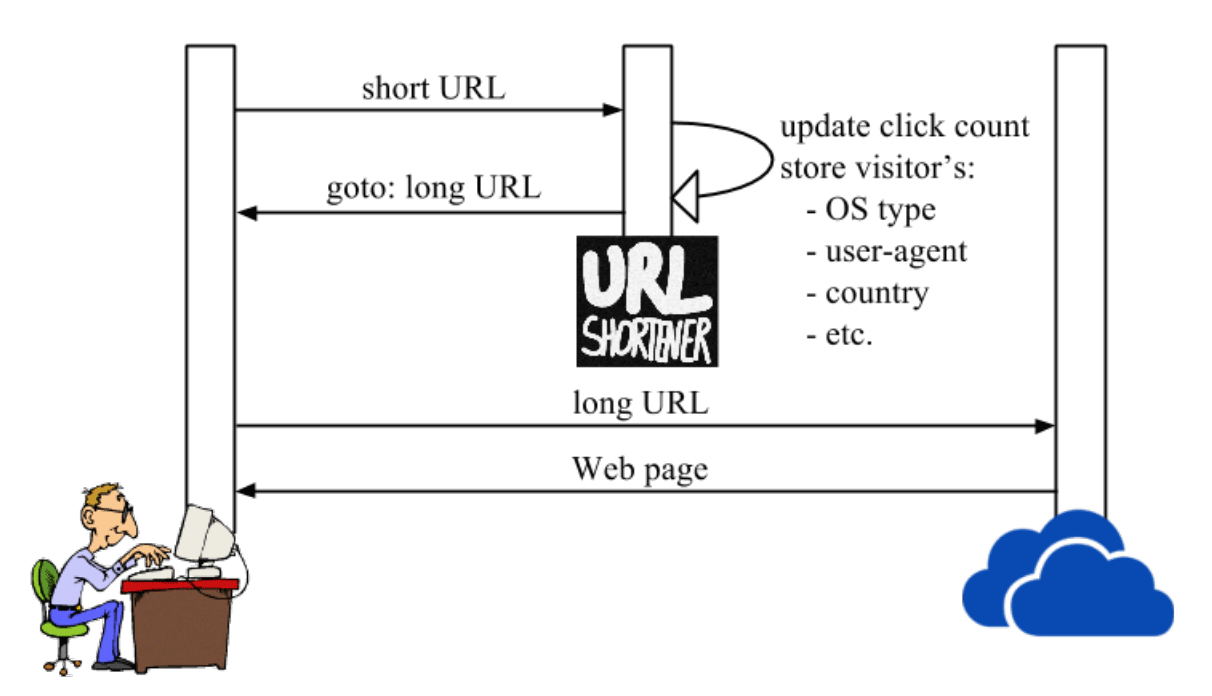
What is a URL shortener? It is essentially a link encoder that hides the true address of the resource from the recipient. Who needs to disguise their links and hide the true address? It's clear to whom: scammers, cybercriminals and companies whose URL does not fit on a business card.
Recently, many cloud services have directly integrated link shorteners: for example, Google Maps, Microsoft OneDrive provide links to
1drv.ms
and
goo.gl
with a short token. Previously, some shorteners issued a token of 5-6 characters, but then they realized their mistake. The problem is that the space of such tokens is so small that it can be scanned by brute force (see workMartin Georgieva and Vitaly Shmatikova from Cornell University of Technology, arXiv: 1604.02734v1). But five characters are only 62 5 options, and six characters are 62 6 , which is also not very much (56.8 billion). Such a secret link is no longer secret.
This is far from the only reason why someone else's contractors should be avoided .
First, a few words and myths that people believe in. This misleading information prompts some users to use abbreviations.
Abbreviation myths
The myth of saving characters in a tweet
One of the oldest myths. In fact, by using an external shortener, you are doing completely unnecessary and unnecessary work. Nowadays all platforms automatically shorten all links, see Twitter and LinkedIn help .
Thus, platforms threaten their security and users, but that is another question. In any case, it's best not to publish anything publicly. But if you are still forced to perform some actions on social networks, then an external link shortener is definitely useless.
The analytics myth
Some link shorteners offer users rich conversion analytics and other statistics. But there is nothing there that you yourself could not get using free open source analytics services on your hosting, as well as social network data. The social network itself will tell you how many times you clicked on the link and what is its CTR.
If you run a business on social media and really want to get more advanced analytics, then it is better to use UTM tracking modules (Urchin Tracking Modules), rather than link shorteners:

Reducers problems
Zero privacy
 You have no way to control someone else's contractor. Some of them do not behave quite correctly. For example, they install a tracking cookie on your device to further track Internet activities. This is normal practice, as do Google, Facebook and other sites that make money from personal ad targeting. To effectively target ads, they need to collect a detailed dossier for each person.
You have no way to control someone else's contractor. Some of them do not behave quite correctly. For example, they install a tracking cookie on your device to further track Internet activities. This is normal practice, as do Google, Facebook and other sites that make money from personal ad targeting. To effectively target ads, they need to collect a detailed dossier for each person.
Zero meaning
A shortened URL contains a meaningless set of characters that is almost impossible to remember. It does not say anything about the real address, about the name of the site and about the page to which it links. And it can hardly be entered manually, from memory, or dictated over the phone.
Broken links
If the shortener fails, then your links become unavailable. If you used only one shortener for all links, then they all fail at once!
Do you think this will never happen? Take a look at the list of dead shorteners !
Your shortener
So it's best to avoid third-party services and, if necessary, write your own shortcut and run it on your server. For example, it took the famous programmer and evangelist Grigory Bakunov 40 minutes . Subsequently, Grigory gave the project to Yandex.
Launching the shortener is really easy. It can be configured even in the cloud. For example, an instance in S3 can act as a redirect engine . Or any other hosting. You just create an object with a redirect to the target URL for each short URL, that's all. If you need analytics, then you have to try, but there is nothing complicated in the basic functionality.
All your long links can be edited with your own shortener. While this does not eliminate some of the loss of meaning problems, there are far fewer security threats than with an external shortener. That is, your contractor is just the lesser evil.
One way or another, but link shorteners in general are an extra level of abstraction, an increase in the attack surface: interception and spoofing of links, phishing, tracking cookies, an unpredictable URL.
Although any disadvantages can be turned into advantages. For example, a shortener allows you to change the URL for NSFW links to pass them on to a chat mate. There is a shortcut for rebranding . Someone likes jokes and gags. There are not abbreviators, but link extenders... And if you launch your own service, then the space of possible jokes expands by an order of magnitude. Some people are ready for a lot for the sake of "lulz" - that's the whole point.
